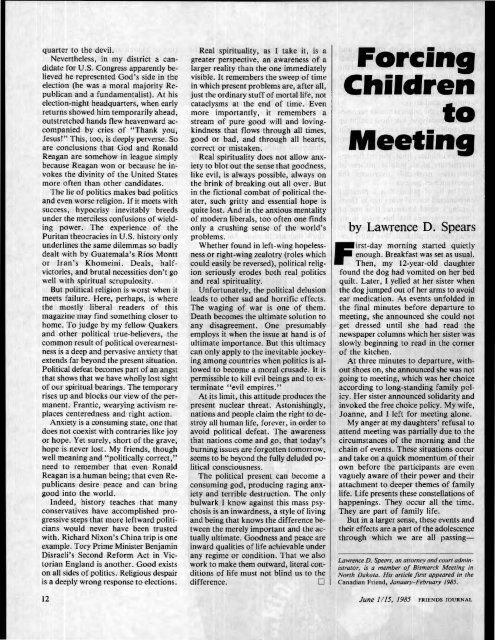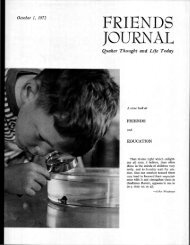Friends Journal
Friends Journal
Friends Journal
Create successful ePaper yourself
Turn your PDF publications into a flip-book with our unique Google optimized e-Paper software.
quarter to the devil.<br />
Nevertheless, in my district a candidate<br />
for U.S. Congress apparently believed<br />
he represented God's side in the<br />
election (he was a moral majority Republican<br />
and a fundamentalist). At his<br />
election-night headquarters, when early<br />
returns showed him temporarily ahead,<br />
outstretched hands flew heavenward accompanied<br />
by cries of " Thank you,<br />
Jesus!" This, too, is deeply perverse. So<br />
are conclusions that God and Ronald<br />
Reagan are somehow in league simply<br />
because Reagan won or because he invokes<br />
the divinity of the United States<br />
more often than other candidates.<br />
The lie of politics makes bad politics<br />
and even worse religion. If it meets with<br />
success, hypocrisy inevitably breeds<br />
under the merciless confusions of wielding<br />
power. The experience of the<br />
Puritan theocracies in U.S. history only<br />
underlines the same dilemmas so badly<br />
dealt with by Guatemala's Rios Montt<br />
or Iran's Khomeini. Deals, halfvictories,<br />
and brutal necessities don't go<br />
well with spiritual scrupulosity.<br />
But political religion is worst when it<br />
meets failure. Here, perhaps, is where<br />
the mostly liberal readers of this<br />
magazine may find something closer to<br />
home. To judge by my fellow Quakers<br />
and other political true-believers, the<br />
common result of political overearnestness<br />
is a deep and pervasive anxiety that<br />
extends far beyond the present situation.<br />
Political defeat becomes part of an angst<br />
that shows that we have wholly lost sight<br />
of our spiritual bearings. The temporary<br />
rises up and blocks our view of the permanent.<br />
Frantic, wearying activism replaces<br />
centeredness and right action.<br />
Anxiety is a consuming state, one that<br />
does not coexist with contraries like joy<br />
or hope. Yet surely, short of the grave,<br />
hope is never lost. My friends, though<br />
well meaning and " politically correct,"<br />
need to remember that even Ronald<br />
Reagan is a human being; that even Republicans<br />
desire peace and can bring<br />
good into the world.<br />
Indeed, history teaches that many<br />
conservatives have accomplished progressive<br />
steps that more leftward politicians<br />
would never have been trusted<br />
with. Richard Nixon's China trip is one<br />
example. Tory Prime Minister Benjamin<br />
Disraeli's Second Reform Act in Victorian<br />
England is another. Good exists<br />
on all sides of politics. Religious despair<br />
is a deeply wrong response to elections.<br />
12<br />
Real spirituality, as I take it, is a<br />
greater perspective, an awareness of a<br />
larger reality than the one immediately<br />
visible. It remembers the sweep of time<br />
in which present problems are, after all,<br />
just the ordinary stuff of mortal life, not<br />
cataclysms at the end of time. Even<br />
more importantly, it remembers a<br />
stream of pure good will and lovingkindness<br />
that flows through all times,<br />
good or bad, and through all hearts,<br />
correct or mistaken.<br />
Real spirituality does not allow anxiety<br />
to blot out the sense that goodness,<br />
like evil, is always possible, always on<br />
the brink of breaking out all over. But<br />
in the fictional combat of political theater,<br />
such gritty and essential hope is<br />
quite lost. And in the anxious mentality<br />
of modern liberals, too often one finds<br />
only a crushing sense of the world's<br />
problems.<br />
Whether found in left-wing hopelessness<br />
or right-wing zealotry (roles which<br />
could easily be reversed), political religion<br />
seriously erodes both real politics<br />
and real spirituality.<br />
Unfortunately, the political delusion<br />
leads to other sad and horrific effects.<br />
The waging of war is one of them.<br />
Death becomes the ultimate solution to<br />
any disagreement. One presumably<br />
employs it when the issue at hand is of<br />
ultimate importance. But this ultimacy<br />
can only apply to the inevitable jockeying<br />
among countries when politics is allowed<br />
to become a moral crusade. It is<br />
permissible to kill evil beings and to exterminate<br />
"evil empires."<br />
At its limit, this attitude produces the<br />
present nuclear threat. Astonishingly,<br />
nations and people claim the right to destroy<br />
all human life, forever, in order to<br />
avoid political defeat. The awareness<br />
that nations come and go, that today's<br />
burning issues are forgotten tomorrow,<br />
seems to be beyond the fully deluded political<br />
consciousness.<br />
The political present can become a<br />
consuming god, producing raging anxiety<br />
and terrible destruction. The only<br />
bulwark I know against this mass psychosis<br />
is an inwardness, a style of living<br />
and being that knows the difference between<br />
the merely important and the actually<br />
ultimate. Goodness and peace are<br />
inward qualities of life achievable under<br />
any regime or condition. That we also<br />
work to make them outward, literal conditions<br />
of life must not blind us to the<br />
difference. 0<br />
Forcing<br />
Children<br />
to<br />
Meeting<br />
by Lawrence D. Spears<br />
First-day morning started quietly<br />
enough. Breakfast was set as usual.<br />
Then, my 12-year-old daughter<br />
found the dog had vomited on her bed<br />
quilt. Later, I yelled at her sister when<br />
the dog jumped out of her arms to avoid<br />
ear medication. As events unfolded in<br />
the final minutes before departure to<br />
meeting, she announced she could not<br />
get dressed until she had read the<br />
newspaper columns which her sister was<br />
slowly beginning to read in the corner<br />
of the kitchen.<br />
At three minutes to departure, without<br />
shoes on, she announced she was not<br />
going to meeting, which was her choice<br />
according to long-standing family policy.<br />
Her sister announced solidarity and<br />
invoked the free choice policy. My wife,<br />
Joanne, and I left for meeting alone.<br />
My anger at my daughters' refusal to<br />
attend meeting was partially due to the<br />
circumstances of the morning and the<br />
chain of events. These situations occur<br />
and take on a quick momentum of their<br />
own before the participants are even<br />
vaguely aware of their power and their<br />
attachment to deeper themes of family<br />
life. Life presents these constellations of<br />
happenings. They occur all the time.<br />
They are part of family life.<br />
But in a larger sense, these events and<br />
their effects are a part of the adolescence<br />
through which we are all passing-<br />
Lawrence D. Spears, an atlorney and court administrator,<br />
is a member of Bismarck Meeting in<br />
North Dakota. His article first appeared in the<br />
Canadian Friend, January-February /985.<br />
June 1/]5, 1985 FRIENDS JOURNAL






